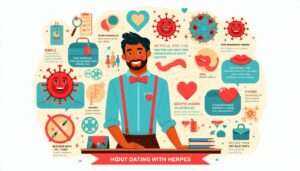Navigating Sex and Dating with Herpes: A Comprehensive Guide
Living with herpes doesn’t mean your dating life is over. In fact, with the right knowledge and approach, you can have fulfilling relationships and a satisfying sex life. This guide will walk you through everything you need to know about dating and sex when you have herpes, from disclosure to protection and beyond.

Table of Contents
ToggleUnderstanding Herpes: The Basics
Before we dive into dating and sex, let’s quickly recap what herpes is. Herpes is a common viral infection caused by the herpes simplex virus (HSV). There are two types:
- HSV-1: Typically associated with oral herpes (cold sores)
- HSV-2: Usually causes genital herpes
The Ultimate Guide to Using Condoms: Everything You Need to Know for Safe and Enjoyable Sex
However, either type can infect either location. According to the World Health Organization, an estimated 3.7 billion people under age 50 have HSV-1, and about 491 million people aged 15-49 have HSV-2.
Herpes is transmitted through skin-to-skin contact, including kissing and sexual activity. It’s important to note that herpes can be transmitted even when there are no visible symptoms.

The Emotional Impact of a Herpes Diagnosis
Getting a herpes diagnosis can be emotionally challenging. You might feel:
Understanding Condom Sizes: A Comprehensive Guide to Choosing the Right Fit
- Shocked
- Angry
- Ashamed
- Worried about future relationships
These feelings are normal but remember herpes is incredibly common and doesn’t define you. Many people with herpes have healthy, happy relationships. If you’re struggling to cope, consider talking to a therapist or joining a support group. The American Sexual Health Association offers resources for people living with herpes.

Dating with Herpes: When and How to Disclose

One of the biggest concerns for people with herpes is when and how to tell potential partners about their status. Here’s a step-by-step approach:
- Timing: There’s no perfect moment, but it’s best to disclose before things get sexual. This gives your partner time to process the information and ask questions.
- Setting: Choose a private, comfortable place where you can talk without interruptions.
- Preparation: Arm yourself with facts about herpes transmission and treatment. Be ready to answer questions.
- The Conversation: Be direct and honest. You might say something like, “Before we go further, I want you to know that I have herpes. I’m happy to answer any questions you have.”
- Give them time: Your partner might need time to think. That’s okay.
Remember, someone who rejects you solely because of herpes isn’t the right person for you anyway.
Sexually Transmitted Infections (STIs): A Comprehensive Guide to Understanding, Prevention and Treatment
Reducing Transmission Risk
While there’s always a risk of transmission, there are several ways to minimize it:
Do Condoms Expire? Everything You Need to Know About Condom Safety and Shelf Life
- Antiviral Medications: Daily suppressive therapy can reduce the risk of transmission by up to 50%.
- Condoms and Dental Dams: These don’t provide 100% protection (because herpes can be present on skin not covered by barriers), but they significantly reduce risk.
- Avoid Sexual Contact During Outbreaks: The risk of transmission is highest during an outbreak.
- Know Your Body: Learn to recognize the signs of an impending outbreak (tingling, itching) and avoid sexual contact during these times.
- Consider Your Activities: Some sexual activities carry a lower risk of transmission than others. Talk to your healthcare provider about specific risks.
Sex with Herpes: Keeping It Safe and Enjoyable

Having herpes doesn’t mean you can’t have a great sex life. Here are some tips:
Dental Dams: The Ultimate Guide to Safer Oral Sex
- Communication is Key: Talk openly with your partner about concerns, boundaries, and what feels good.
- Get Creative: Explore non-penetrative sexual activities that might carry a lower risk of transmission.
- Practice Self-Care: Stress can trigger outbreaks, so find ways to relax and take care of yourself.
- Stay Informed: Keep up with the latest research on herpes treatment and prevention.
- Embrace Intimacy: Remember that sex is about more than just physical acts. Focus on building emotional intimacy as well.
Dealing with Rejection
Despite your best efforts, some people may choose not to pursue a relationship after learning about your herpes status. While this can be painful, it’s important to remember:
- Their decision is often based on misinformation or fear.
- You’re not defined by your herpes status.
- The right person will accept you, herpes and all.
If you face rejection, allow yourself to feel hurt, but don’t let it diminish your self-worth. Consider connecting with others who have herpes through support groups or online communities.
The Future of Herpes Treatment
Research into herpes treatment and prevention is ongoing. Some promising developments include:
- Vaccines: Several potential herpes vaccines are in various stages of clinical trials.
- Gene Editing: Researchers are exploring CRISPR technology to potentially “cut out” the herpes virus from infected cells.
- New Antivirals: Scientists are working on more effective antiviral treatments.
While a cure isn’t yet available, these advancements offer hope for better management and prevention in the future.
Conclusion:
Living with herpes presents challenges, but it doesn’t have to limit your dating or sex life. With honesty, communication, and the right precautions, you can have fulfilling relationships and a satisfying sex life. Remember, you’re not alone, and having herpes doesn’t define you or your worth as a partner.


